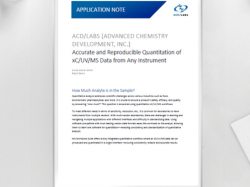Effective data management: lessons to learn from Big Pharma
Posted: 23 February 2022 | Duncan van Rijsbergen (Iperion), Frits Stulp (Iperion) | No comments yet
Here, Frits Stulp and Duncan van Rijsbergen of Iperion explore how startups can establish the most efficient data management processes and systems, avoiding the kind of mistakes made by Big Pharma.


Biopharma is now big business. The EU is aiming to establish a major biotech hub close to the European Medicines Agency (EMA)’s new base in Amsterdam, recognising that European biotechs should make the most of a major opportunity to transform patient outcomes with cutting-edge therapies.
For ambitious biotech newcomers, starting out as they mean to go on – with reliable 360-degree product and process visibility – will set them in good stead for the future. So, what might all of this look like in reality?
Do not ‘follow my leader’
Usually, young companies look to more-established players for how to keep records and master regulatory rigour, but in life sciences the big players are not the best model to follow when it comes to data management. These are companies which have typically brought in technology systems on a targeted, need-oriented basis, often behind the curve and under a series of restrictions, including what was available at the time and what would work with their current IT estate.
For young, dynamic organisations which have the luxury of a clean slate, it makes sense to capitalise on emerging best practice and be data-driven from day one.
Avoid the pain points
The first challenge for biotechs is that their primary focus up has been to excel scientifically. Any investment they have secured will be channelled into the one or two compounds they are working on bringing to market. At such an early stage, they may not appreciate the need to capture information in a structured way or to invest in formal infrastructure.
capitalise on the immense amount of work that has gone into setting new data standards and data exchange mechanisms”
Yet, from the very outset, biotech teams will be generating and compiling information, whether in the form of lab reports or some other record. If this activity is unstructured (informal manual notes, spreadsheet-based readings, Word documents), this will only be storing up problems for later. When, eventually, such companies are ready to go to market, they will need to find and collate all of that information to demonstrate their readiness and smooth the path to authorisation. This is where they may begin to experience the pain of poor information management.
Appoint a CTO
It is far better to embrace information or data management considerations and appropriate technology right from the outset. This starts with appointing a chief technology officer (CTO) or information/data ‘evangelist’ and bringing them to the table for even the earliest scientific discussions.
This way, the biotech adopts a data-based mindset and discipline from day one, understands the value and role of all of the information it captures and maintains this in a way that will help bring products to market without friction.
Establishing data/information management rigour from the start also promotes introspection, so that the team establishes a rich understanding of the product from every angle – something regulators keenly encourage.
The objective should be to get into the habit of recording everything in a standardised, accessible and combinable way. This will set the company in good stead for the 360-degree transparency that all companies need to aim for. Comprehensive clinical data, meanwhile, could support earlier review and approval of products – the Holy Grail for ambitious start-ups with important new advanced therapies under development.
Embrace data standards


Traditionally, Big Pharma has made information management the preserve of individual departments – eg, Quality, CMC (Chemistry Manufacturing and Controls) or Safety – in support of a targeted use case: most notably marketing authorisation holder (MAH) dossiers for regulatory submission.
Data flows in each silo inform individual summaries, overlaid with a product description – when, logically, the information flow should be the other way round. Even then, the picture is not complete: information should be feeding into this picture from the earliest research stages. Capturing every insight in a structured way would enable biotechs to track and report on every aspect of what they do, at any point now or in the future.
We advocate that companies take an architecture-based approach to the way they capture and manage information, rather than trying to find the optimum software application to meet all of their needs today and tomorrow. This involves embracing data standards – and ensuring that information can be exported and combined easily without risk of overlap or error.
Be proactive
One of the huge advantages biotechs have is that they can capitalise on the immense amount of work that has gone into setting new data standards and data exchange mechanisms, starting as they mean to go on. The latest data standards in pharma include CDISC1 and ISO IDMP as currently being implemented in the EU.2
Biotech products are more complex than more established pharma lines and that provides a compelling reason for biotechs to command a proactive role”
Just as importantly, there are industry consortia working to encourage standards-based data exchange. One of the latest and most exciting examples, with direct relevance to biotechs, is Accumulus Synergy, which is developing a global information exchange platform to transform how drug innovators and health regulators interact, using comparable parcels of data that have been compiled in a standardised way. Another is Pistoia Alliance, which aims to promote life sciences collaboration and accelerate innovation.
Biotech products are more complex than more established pharma lines and that provides a compelling reason for biotechs to command a proactive role in these consortia and discussion forums about the future of data management and exchange.
Aim for a live record
Ultimately, what does good look like? The aim for biotechs (indeed, all pharma companies) should be to work towards a living dossier – a live record of a product which tracks its evolution from conception. Keeping this vision in mind will help ambitious young startups avoid investing in unwieldy regulatory bureaucracy so that they can focus more of their time and energy on their products.
Data is not so much a problem as an opportunity for young biotech firms. Think of it as an opportunity to redefine what is possible and get it right from the start.
About the authors


Frits Stulp is Managing Director of Iperion, a Deloitte company, where he leads a team of regulatory/IDMP experts active in various projects to deliver value to both pharmaceutical companies as well as regulators. In addition to having more than two decades’ industry and consultancy experience, Frits is regarded internationally as a subject matter expert on IDMP and he proactively shares his rich knowledge and experience wherever he can. He is contactable at: [email protected]


Duncan van Rijsbergen is a specialist in Regulatory Affairs Business Process Improvement, Structured Product Data, and Data Interoperability at Iperion. He is contactable at: [email protected]
Iperion, now part of Deloitte, is a globally operating life sciences consultancy firm.
References
- https://www.cdisc.org/standards
- https://www.ema.europa.eu/en/human-regulatory/overview/data-medicines-iso-idmp-standards-overview
Related topics
Big Data, Big Pharma, Biopharmaceuticals, Industry Insight, Informatics, Regulation & Legislation, Technology
Related organisations
Accumulus Synergy, The European Medicines Agency (EMA), The Pistoia Alliance









